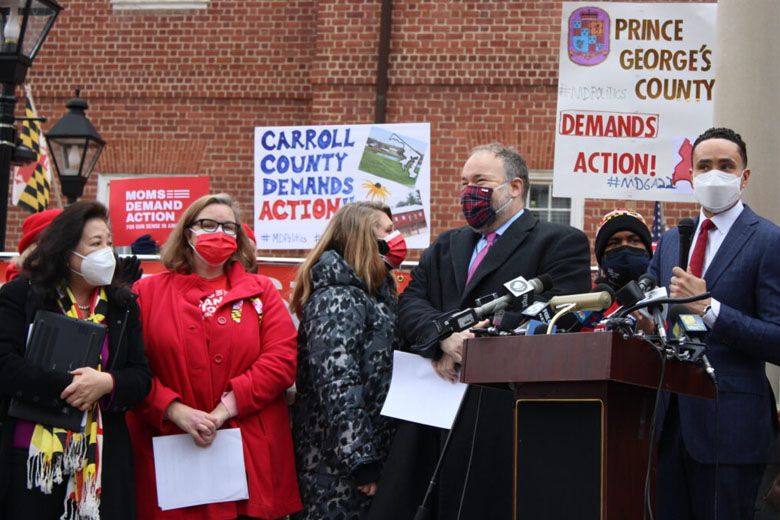This article was republished with permission from WTOP’s news partners at Maryland Matters. Sign up for Maryland Matters’ free email subscription today.

This content was republished with permission from WTOP’s news partners at Maryland Matters. Sign up for Maryland Matters’ free email subscription today.
The House and Senate took different approaches to draft laws that would prohibit untraceable ghost guns on Wednesday.
House Bill 425, sponsored by Del. Lesley J. Lopez (D-Montgomery), would ban sales of ghost guns beginning June 1, 2022, and possession beginning Jan. 1, 2023.
The bill passed out of the House Judiciary Committee unamended Friday on a party-line vote.
House Republicans made several attempts to alter the legislation on the House floor Wednesday. The Senate bill will head to that chamber’s floor soon, after a series of amendments were approved by the Senate Judicial Proceedings Committee on Wednesday evening.
None of the amendments proposed by House Republicans no Wednesday were successful.
Minority Leader Jason C. Buckel (R-Allegany) offered an amendment to subject people convicted of firearm theft to a felony prison sentence of five years or a fine of $1,000 for a first offense, and 10 years imprisonment or a $2,500 fine for subsequent convictions.
Lopez said that possession of a stolen firearm under current state law is subject to five years behind bars and an additional five years for every other stolen gun in one’s possession.
The amendment failed on a vote of 50-80.
Del. Jesse T. Pippy (R-Frederick) proposed to remove incarceration for the possession or manufacture of ghost guns from the bill completely, comparing the right to bear unserialized arms in protection of one’s country to the war in Ukraine.
Lopez, for the second time, cautioned a colleague about comparing the bill “to the situation that’s going on in Ukraine and Russia” after Del. Daniel L. Cox (R-Frederick) made the same argument Friday.
The amendment failed 44-87.
Del. Wayne A. Hartman (R-Lower Shore) offered an amendment to require the Maryland State Police to publish a list of Federally Licensed Firearms Dealers who provide serialization services in the state.
Lopez said this “unfunded mandate” would place an unnecessary additional workload on the state police.
“I think a simple Google search for your constituents will yield the answers that they need,” she said.
Lopez then explained the serialization process for firearms. She said that government agencies don’t provide serial numbers, they just regulate them. Lopez also said that owners of privately made firearms can choose their serial numbers based on their inventory.
She compared it to how parents choose names for each of their children or people choose lottery numbers.
“Perhaps you’re a romantic, and you want to get your wedding anniversary engraved on your assault rifle, alright? Do you, you can do that,” Lopez said as the chamber erupted into laughter.
Hartman’s amendment failed 49-83.
Del. Johnny Mautz (R-Upper Shore) proposed an amendment to allocate $10 million for a special unit for firearm violence in Baltimore City, saying it will address the issue of gun violence at the heart of the bill.
Lopez asked if Mautz had talked to Baltimore Police Commissioner Michael Harrison or any member of the Baltimore City Delegation. He said no.
His amendment failed 41-88.
In a final attempt to quash the bill, Del. Sid Saab (R-Anne Arundel) made a motion to recommit it to the House Judiciary Committee.
The motion failed 42-89, and the legislation remained unamended.
The House will hold a final vote on its version of the bill in the next few days.
Senate committee tackles amendments
Sponsored by Sen. Susan C. Lee (D-Montgomery), Senate Bill 387 started in the same posture as the House but passed out of the Judicial Proceedings Committee with several changes on Wednesday evening, including amendments to:
- Push the prohibition of possession date to March 1, 2023;
- Include a clarification to allow judges to determine if a person knew or reasonably should have known that they are in possession of an illegal, unserialized firearm;
- Specify that any imprinted serial numbers can’t duplicate the serial numbers on another firearm by the dealer or licensee; and
- Require state police to keep data about previously unserialized guns in a database, which would trigger background checks.
The committee also settled on different penalties for gun possessors and sellers. People possessing ghost guns would be subject to a misdemeanor punishable by up to two years imprisonment.
People who sell or transfer unserialized guns, parts or gun kits under the amended bill would be subject to a misdemeanor punishable by up to five years imprisonment or a $10,000 fine.
The committee’s proposed penalties for possession would avoid a lifetime prohibition on firearm possession; a person convicted of selling or transferring ghost guns would face a lifetime ban.
The penalties for the sale of a ghost gun would be applied to people who sell unserialized guns and unfinished frames or receivers that have reached the point of completion where they could be easily converted into firearms.
Sen. Jack Bailey (R-Calvert and St. Mary’s) lobbied for hobbyists who are in possession of unserialized anodized blocks of aluminum and the appropriate machinery to convert them into guns.
Under the unamended bill, these blocks would be considered unfinished frames or receivers.
“It would take an incredible amount of time and work and machines that nobody has — except those hobbyists” to transform anodized aluminum blocks into guns or receivers, Bailey argued.
The committee struck the provision from the bill.
Ultimately, the amended bill passed out of the committee on a vote of 10-1. Sen. Robert G. Cassilly was the only opposition vote.
In explaining his final vote, Bailey said he voted for the bill’s passage because of the committee’s willingness to address his concerns.
“I’m gonna tell ya … I know that the whole thing with ghost guns is really dangerous for all of us and you guys worked with me on this and I’m not gonna make these hobbyists criminals, yes,” he said.
Senate Judicial Proceedings Chair William C. Smith Jr. (D-Montgomery) congratulated Lee, who has been working on this policy for three years, for passing a bipartisan ghost gun bill out of the committee.
“You just changed the game,” Smith told Lee. “You prohibited ghost guns, you set up a regime in which it’s gonna be registered and the state police will do an automatic background check on people who have unserialized firearms in their possession right now. This is good work.”







